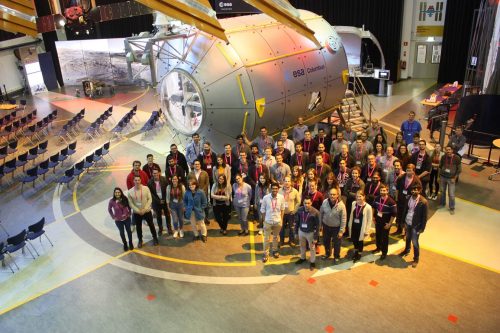 The 6th EIROforum School on Instrumentation, which was held from 13 to 17 May 2019 in Noordwijk, The Netherlands, seems to have hit all the right spots. The main goal of the school, organised by the EIROforum Instrumentation Working Group, was to teach basic instrumentation principles to young researchers, scientists and engineers. But the highlight topic, Artificial Intelligence (AI), and a project day focussed on technology transfer, meant that the 70 participants took home a much wider range of skills.
The 6th EIROforum School on Instrumentation, which was held from 13 to 17 May 2019 in Noordwijk, The Netherlands, seems to have hit all the right spots. The main goal of the school, organised by the EIROforum Instrumentation Working Group, was to teach basic instrumentation principles to young researchers, scientists and engineers. But the highlight topic, Artificial Intelligence (AI), and a project day focussed on technology transfer, meant that the 70 participants took home a much wider range of skills.
Among the topics on instrumentation were the art and science of testing instruments before launching them to space and instrumentation needed to monitor plasma for fusion research. For the highlight topic AI, participants not only learnt the basics of AI but also got insights into how AI supports instrumentation through concrete examples and applications such as predicting the energy consumption of the Mars express satellite and identifying particles in the LHC experiments.
The project day titled “Innovation, Knowledge Transfer and usage of research infrastructures,” put the focus on Technology Transfer. It started with presentations, followed by a hands-on activity that saw teams working on a specific technology case. At the end of the day, each team gave a presentation with a business idea on how to make commercial use of scientific data. “The participants learnt how to go from technology to commercialisation while collaborating in a team,” informs Thibaut Prod’homme who was the chair of the school organising committee.
“I believe that the students do understand the importance of a professional network, many are already on professional networking sites like LinkedIn, but at the school they were able to build upon these professional networks across various institutes,” says Frederic Le Pimpec, who supported the school organisers. Indeed the feedback gathered from the participants indicates that networking and working in multidisciplinary teams was among the highlights of the school. “I had almost no idea about the existence of XFEL or ILL, and no idea of the activities carried out at ESA, ESO or EUROfusion,” said one of the participants from CERN. “It was like opening the eyes and discovering a lot of institutions doing very interesting research, sometimes even related with my work, which I didn’t expect,” she added. Another participant a mechanical engineer from XFEL was positively surprised to see how far the field of instrumentation has advanced and the similarities in instrumentation used in different fields. “It was interesting to see that fusion instrumentation and our instrumentation are not far away [very different from each other],” he said.
Prod’homme says that in the end he believes the school will benefit the participants in both their day-to-day work and in their career by broadening their horizon for future endeavours.
Glimpses from the school are available on the twitter handle https://twitter.com/esi2019
More information is available on the ESI 2019 announcement page.
